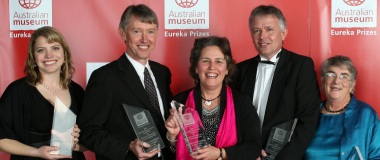156 – Eureka!
Last week, our team won a coveted Eureka Prize for our research in the INFFER project. It was the Australian Research Council Eureka Prize for Excellence in Research by an Interdisciplinary Team.
The winners were myself and Sally Marsh from the University of Western Australia, Anna Roberts and Jenny Alexander from the Department of Primary Industries in Victoria, and Geoff Park from the North Central Catchment Management Authority.
L-R: April Curatolo, David Pannell, Anna Roberts, Geoff Park and Sally Marsh (absent is Jenny Alexander)
The Eureka’s are the most prestigious science prizes in Australia. One of their aims is to raise the profile of science in the community, and they do this quite successfully. There is a program about them on national television (Catalyst) a week or so after the event. They bring together a bunch of high-profile presenters, this year including Cate Blanchett, the Governor General and the Premier of New South Wales.
The latter gave a speech in which he claimed that climate change skeptics are equivalent to Nazi appeasers. I guess he thought he was playing to the prejudices of the audience, but I’m sure I was far from being the only listener to be appalled.
The Prizes were announced and presented at a posh dinner in Sydney, complete with red carpet. The format is like the Oscars; there are a few finalists for each award, and they all have to attend just in case they win. Nobody knows the result until the luminary on stage says “the winner is” and opens the envelope. It’s a pretty tough system for those who don’t win, as I can attest from past experience.
There are 10 research prizes for categories such as environment, water, climate change, medical, defense and our category, interdisciplinary research. (There are also 10 other prizes for science communication, journalism, school science and science leadership).
Our win was for INFFER (the Investment Framework for Environmental Resources – www.inffer.org). INFFER is a tool for developing and prioritising projects to address environmental issues such as water quality, biodiversity, environmental pests and land degradation. It aims to achieve the the most valuable outcomes with the available resources. I’m delighted about the win as it should help us in our quest to have INFFER taken up by environmental managers and governments around Australia.
The response has been really strong, with lots of congratulatory messages coming in. Thanks to everyone for the kind comments.
As well as the five of us who picked up trophies, the award is a big tick for our organisations, particularly the Future Farm Industries CRC. The project wouldn’t exist but for the CRC (and its predecessor, the Salinity CRC). They were responsible for establishing the foundations of the project, for providing the funding we needed to get established and lever other grants, and for practical support. The Department of Sustainability and Environment in Victoria has also been a key supporter, both financially and in other ways. Other funders are the Australian Research Council (Federation Fellowship program), the Department of the Environment, Water, Heritage and the Arts (CERF program). Thanks to all of them.
David Pannell, The University of Western Australia
Further Reading
Pannell, D.J., Roberts, A.M., Alexander, J., Park, G. and Marsh, S. (2009). INFFER (Investment Framework For Environmental Resources), INFFER Working Paper 0901, University of Western Australia, Perth. Here
Roberts, A. and Pannell, D. (2009) Piloting a systematic framework for public investment in regional natural resource management: dryland salinity in Australia, Land Use Policy 26(4): 1001-1010. Full paper (270K) · Journal version on-line
Pannell, D.J. and Roberts, A.M. (2009). Conducting and delivering integrated research to influence land-use policy: salinity policy in Australia, Environmental Science and Policy (forthcoming). Full paper (94K) · Journal version on-line
Various articles about the award: UWA, ScienceNetwork, Australian Museum
